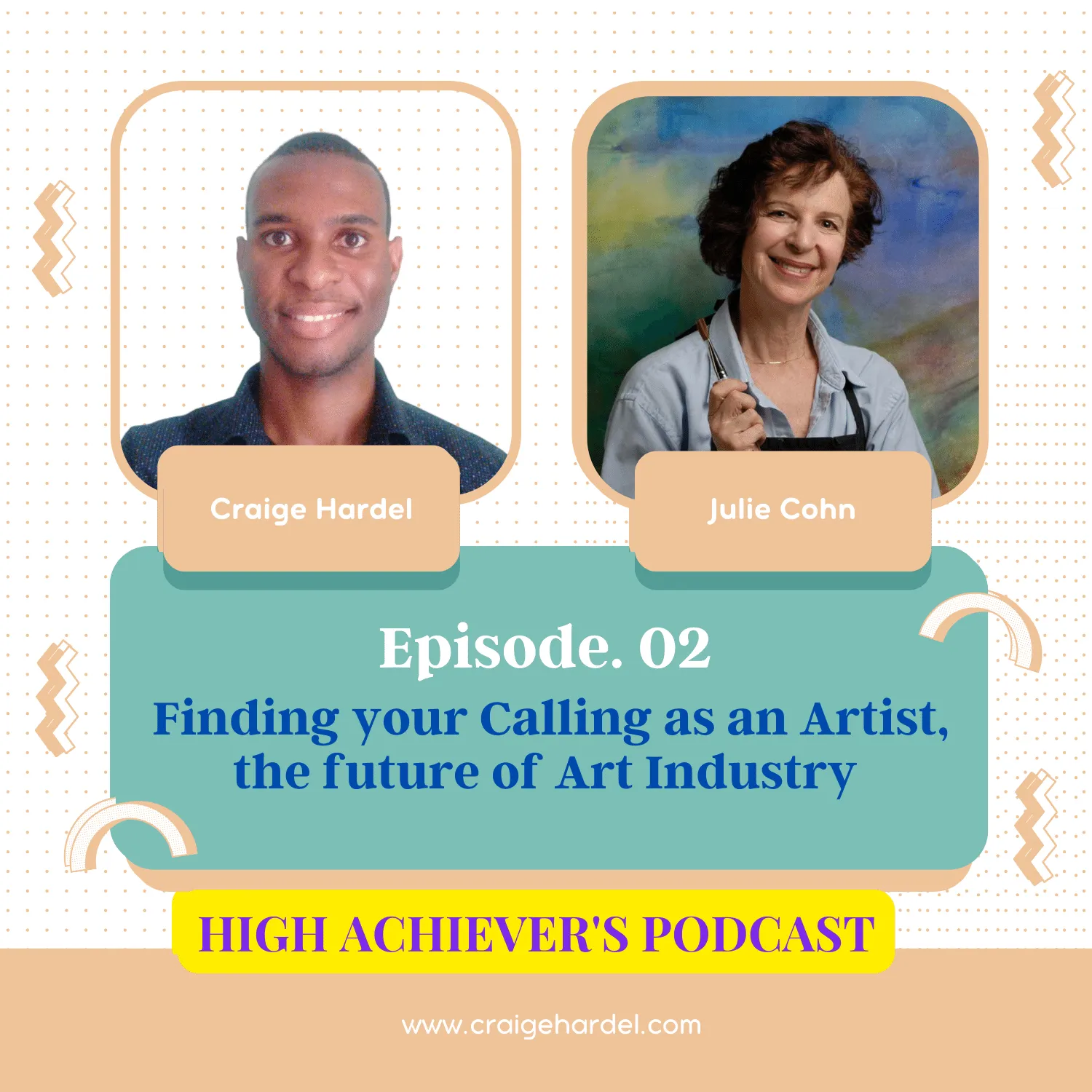Julie Cohn | Finding your Calling as an Artist, the future of Art Industry | EP 02

Download file | Play in new Window
Subscribe: Amazon Music | Apple Podcasts | YouTube | Google Podcasts | iheart Radio
The arts may seem forgotten but it exists in all we do and enjoy. From that Spotify playlist we enjoy listening to on repeat to the paintings on your walls, inspiration is always near.
Today’s guest on the High Achiever’s Podcast we interview Julie Cohn.
Julie is an experienced watercolor artist, teacher, and art history expert. She runs a hybrid gallery, Sustaining Arts, where she showcases her art and shares her passion for sustainability through the arts. Julie believes in tapping into intuition and encourages others to do the same.
Her experimental watercolor paintings evoke stories that are open to interpretation and she enjoys hearing how her art resonates with others.
In your experience, do you believe that credentials matter as much in the creative space?
There's all many ways to have credentials. You could have helped people in a certain way that's very unique and very generous and share.
Julie says “Some of these things you don't have to say, I have this credential. You can say the things you've done and, and you can have awards.
There's all many ways to have credentials. You could have helped people in a certain way that's very unique and very generous and share. I have given my time as a volunteer to this particular organization and done this and that, and that's a credential. So my feeling is if we only look at credentials based on school, it's, it's really the wrong way to go because we have so much potential in us no matter what schooling we've had.
We just keep learning in the way that we want to learn. And if we have something very deep and meaningful and special to share visually as artists, that's what we need”.
Offline promotion methods
So just to expand on this, let's move offline and let's say someone, maybe they have this or they don't and they're looking for extra avenues to promote their work.
Julie says “Yeah, there, there are specific, cafe.org is one of the platforms or links that one can go to online. And what it is is different organizations, companies, galleries, et cetera, are inviting artists to submit their work. They actually have to pay to submit the work.
It's not a lot. But most of the time they have to pay to see if they can get into a show, into an exhibit. So that's one way of doing it. The very old fashioned way is to go into a gallery, look at the gallery, see if it's the right thing, like does this work in here look like my work? And then ask the gallerist, are you taking submissions online or can I come back in with a portfolio to show you, like an actual portfolio to bring in?
Most of the time galleries do not like people walking in to just see if they can get their art in there. They want people to come in to enjoy their gallery. However, if a person's very polite about it and says, you know, I'm just curious, do you have a submission form? Are you looking for artists at all?
It's really not a bad thing to ask. We have to find out. If, if people really want someone, and also put it out there to friends, family, that you are looking for spaces to put your art, let them all know. Because they often come up in an email like, Julie, I know of this show, this exhibit, they're looking for artists.
Or, oh, I just went to this gallery. It's amazing and it reminds me of your art. So ask people that you know, I wanna get some help here. So they're just lots of different ways. But go out and pave the streets too, like go and walk and look at galleries and get a sense of, well, what is a gallery that really fits with my work?
Because not all galleries are going go with every artist's work
How to deal with criticism from family
what about if the criticism comes from family, though and the criticism comes from family, spouses as well? You know?
Julie goes on” Oh, I have some stories. My husband and I have worked out a lot of this. If he's in a mood and I can tell he's just not in the right place to look at my art, I say to him, it's not the right time to look at this. Right? He goes, yeah, not really , because you know, if he's in a, in a, if something difficult has happened with him that day, or he's tired or whatever, like not a good time.
Now, let's say he does say something that's not really nice, okay, about my art, I would say.
I could blame him, but here's the reality. Anybody can say anything they want about our art. If they say something that we're affected by and we're hurt by it, sometimes it means that we need to look at that ourselves to see if it really is true versus just blaming them. They may have a bit of truth in what they're saying, or if I'm very clear that this artwork I believe is amazing.
I'll just say it back to them. No, this is one of my best pieces, like Stand up for yourself, because one of the things that my cancer was about was not speaking. Breast cancer can have affiliated with it. The idea that we don't speak up for ourselves, and for me in my family, a wonderful loving family, but also sometimes critical and overwhelming.
Like, I'm gonna give you advice before you're ready. , you know, this is the kind of family, they'll just jump right in and give me advice. And I did not ask for it . So basically when people are like that, it's like, Ooh, I have to decide what, what do I really see for myself and ma basically that they're coming from their own feeling of insecurity, not me.
And I say to them, you know, you, it sounds like feel better this way, doing it this way, and I need to think about what I need to do. For me, it's like this separating so we don't get enmeshed with each other and blame them. It's anybody could say really anything they want.
They're, they can not be a nice person or they could be nice, but how do we separate from that to say, Hey, you are not being like loving right now, so how can I be loving to myself?
That's all we can really control.
What are some things you could recommend to authors to get more fulfillment from their work and also them personally?
Art is about sustaining oneself. When we do art of any kind, it's a way to basically, uh, get a, a reset in a sense. Like, you know, how things happen in life that are difficult and we go, oh, if I could just play my guitar, if I could just go do my art.
And, And even, even for half an hour , like, it's, it's not about how well we do it. It's not, and I think the problem that happens in many ways with people is there's a critic and it's not even necessarily themselves, it's somebody who told them that they're not very good. In some way in their life and they let that person in to tell them they've not done a good job and they should be doing better.
And this critical part of us, if we could be nice to it and say, I understand you. I see you and I'm gonna ask you to please leave right now. Like we don't have to get mad at it. We can just say, you know what, I see you coming in. I honor that you have your needs, but I have mine and this is how I'm going to now be with myself.
To learn more from Julie Cohn, visit sustainingarts.com
